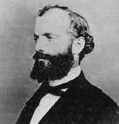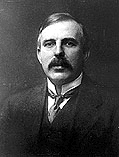|
Kekule's flash of inspiration about the flat ring structures for
benzene and other aromatic molecules was as much of a turning point
for organic chemistry as Dalton's atoms had been a century earlier
for chemistry in general.
Organic chemistry, considered as the art of knowing what valuable
dyes and drugs could be extracted from what natural or synthetic
sources, was doing well in Germany, but chemistry remained principally
a body of empirical knowledge. It was as much a trade as a science.
The British scientist Lord Rutherford expressed the disdain of the
physicist for such empirical sciences, by dividing all science arrogantly
into two branches: physics and stamp collecting.
At the turn of the century, the field of chemistry was a large and
loose stamp collection without an album.
Top right: FRIEDRICH AUGUST KEKUL� (1829 - 1896)
Bottom right: LORD ERNEST RUTHERFORD (1871 - 1937)
|


|

